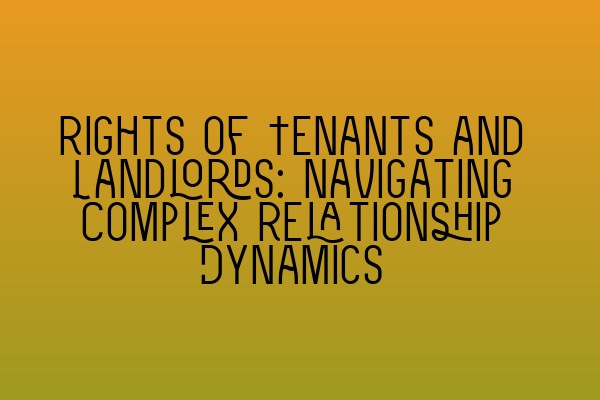Rights of Tenants and Landlords: Navigating Complex Relationship Dynamics
When it comes to the relationship between tenants and landlords, there are often complexities and challenges that arise. Both parties have rights and responsibilities that need to be respected and understood in order to maintain a healthy and harmonious living arrangement. In this blog post, we will delve into the key rights of tenants and landlords and explore how they can navigate the intricate dynamics of their relationship.
Tenant’s Rights and Responsibilities
Tenants have specific rights granted to them by law, ensuring that they are protected and treated fairly by their landlords. These rights include:
- Right to a safe and habitable property: Landlords are obligated to provide a property that meets basic health and safety standards. This includes ensuring proper maintenance of the property, addressing any safety hazards, and providing functional heating, plumbing, and electrical systems.
- Right to privacy: Tenants have the right to enjoy peaceful and private living conditions. Landlords must obtain proper permission before entering the property, except in cases of emergency.
- Right to timely repairs: If there are any necessary repairs or maintenance issues in the property, tenants have the right to have them addressed in a timely manner. Landlords should be responsive to repair requests and ensure a habitable living environment.
- Right to proper notice: When it comes to termination of the lease or any changes in the rental agreement, tenants have the right to receive proper notice in advance. This allows them to plan accordingly and make necessary arrangements.
Alongside these rights, tenants also have certain responsibilities, including:
- Payment of rent: Tenants are responsible for paying rent on time and in full as outlined in the lease agreement. Failure to do so may result in legal consequences, such as eviction.
- Maintaining the property: Tenants are expected to take reasonable care of the property and its surroundings. This includes keeping the premises clean, reporting any damages, and abiding by the terms of the lease agreement.
Understanding these rights and responsibilities will empower tenants to take action when necessary and ensure a smooth relationship with their landlord.
Landlord’s Rights and Responsibilities
Just as tenants have rights, landlords also have certain rights and responsibilities that they must uphold. These include:
- Right to receive rent: Landlords have the right to collect rent as agreed upon in the lease agreement. They can also take legal action if tenants fail to pay rent.
- Right to select tenants: Landlords have the right to choose tenants based on their eligibility and suitability for the property. They can conduct background checks and references to ensure a good fit.
- Right to manage their property: Landlords have the right to maintain and manage their property, which includes making necessary repairs, conducting inspections, and enforcing lease agreements.
- Right to eviction: In case of a breach of the lease agreement or non-payment of rent, landlords have the right to evict tenants following the legal process.
With these rights come important responsibilities that landlords must adhere to, such as:
- Property maintenance: Landlords are responsible for ensuring that the property is in good condition and meets health and safety standards. This includes maintaining the structure, addressing repairs, and keeping common areas clean.
- Security deposit management: Landlords must handle security deposits in accordance with the law. This includes collecting and holding the deposit, providing a written statement of deductions, and returning the deposit within a specified timeframe.
By understanding these rights and responsibilities, landlords can maintain a professional and lawful relationship with their tenants.
Navigating the Relationship Dynamics
As the relationship between tenants and landlords can sometimes be complex, it’s important to approach it with clear communication and understanding. Here are some tips to navigate the dynamics:
- Clear and comprehensive lease agreements: Both parties should have a well-drafted lease agreement that clearly outlines the terms and conditions of the tenancy. This can help avoid misunderstandings and disagreements in the future.
- Regular communication: Tenants and landlords should maintain open lines of communication to address any issues or concerns promptly. This can help build trust and prevent conflicts from escalating.
- Documentation of repairs and maintenance: Both parties should keep records of any repairs or maintenance requests made. This can serve as evidence in case of disputes and ensure transparency in the maintenance process.
- Seek legal advice when needed: If any legal issues or disputes arise, it’s wise to consult with a solicitor who specializes in property law. They can provide guidance and advocate for your rights.
Remember, a strong and respectful tenant-landlord relationship is beneficial for both parties. By understanding and respecting each other’s rights and responsibilities, tenants and landlords can create a harmonious and mutually beneficial living arrangement.
If you found this article helpful, you may also be interested in these related articles:
- Misrepresentation in Contracts: Unveiling Deceptive Practices
- A Closer Look at SQE Contract Law Syllabus
- SQE Contract Law: Analyzing Landmark Cases and Influential Judicial Decisions
- Understanding Contractual Capacity: Rights and Limitations
- Interactive SQE Mock Tests for Contract Law: Test Your Knowledge
By familiarizing yourself with these articles, you can deepen your knowledge of contract law and related topics.
